- Home
- Anthony Doerr
Memory Wall: Stories Page 12
Memory Wall: Stories Read online
Page 12
The seed keeper disembowels pumpkins and spreads the pulp across ragged sheets of plastic. The seeds are shining and white. The insides of the pumpkins smell like the river.
When she looks up Teacher Ke is standing in front of her, thin, impossibly old. “Your son,” he says. “He is one of them.”
It is drizzling and the garden is damp and quiet. “He’s a grown man. He makes his own decisions.”
“We’re numbers to him. We’re less than that.”
“It’s okay, Teacher,” she says. “Here.” She drags a wet hand across her forehead. “I’m almost done. You must be cold. I’ll make some tea.”
The schoolteacher backs away, palms up. The wind moves in his coat and she has the sudden impression his whole body is made of cloth and could blow away at any moment.
“He’s here to arrest me,” he hisses. “He’s here to kill me.”
NUMBERS
Memory is a house with ten thousand rooms; it is a village slated to be inundated. The seed keeper sees six-year-old Li Qing wading in mud at the edges of the docks. She sees him peering past the temple eaves at stars.
He was born with hair so thick and black it seemed to swallow light. His father drowned three months later and she brought up the boy alone. Math was the only schoolwork he cared for: algebra, geometry, graphs, and diagrams; incorruptible rules and explicit conclusions. A world not of mud, trees, and barges, but of volumes, circumferences, and surface areas.
“Equations are complete,” he told her once. “If they have a solution, the solution is the same for everybody. Not like”—he gestured at her seedlings, the house, the gorge beyond—“this place.” At fourteen he started school in the city. By seventeen he had enrolled in civil engineering school and had no time for anything else. I am so busy, he would write. The environment here is very competitive.
He joined Public Security; he patrolled the aisles of train cars wearing a handgun, a short-brimmed cap, and trousers with stripes down the legs. Each time he returned, he looked slightly different, not merely older, but changed: a new accent, the cigarettes, three sharp knocks on the door. It was as if the city was entering his body and remaking it; he’d look at the low dark houses and wandering hens and farmers with their rope belts as if at film from another century.
There was no dramatic falling-out, no climactic fight. He’d send teapots for her birthdays. On New Year’s he’d send a little glass dolphin, or an electric toothbrush, or seven clouds made from sequins. Whatever space existed between them somehow extended itself, growing invisibly, the aerial roots of ivy burrowing into mortar. A year would revolve. Then another.
Now it is dusk again and Li Qing sits at her table in his jacket and tie and recites numbers. The dam will be made from eleven million tons of concrete: Its parapet will be a mile long; its impoundment will swallow a dozen cities, a hundred towns, a thousand villages. The river will become a lake and the lake will be visible from the moon.
“The size of the thing,” he says, and smoke rises past his glasses.
THE LEAVING
Heads of families are summoned to the Government House in groups of six. The choice is a government job or a year’s wages in cash. Apartments in resettlement towns will be discounted. Everyone takes the money.
The ore factory closes. The owner of the noodle restaurant leaves. The barber leaves. Every day wedding armoires and baskets of cloth and boxes and crates trundle past the seed keeper’s window on the backs of porters.
Hardly anyone buys seeds for winter wheat. The seed keeper stares at her containers and thinks: It would be easier if I had traveled. I could have gone to see Li Qing in the city. I could have climbed onto a ferry and seen something of the world.
By the end of the week the engineers are gone. The uppermost row of red markers bisects the rock face above town. The river will rise sixty-four meters. The tops of the oldest trees won’t reach the surface; the gable of the Government House’s roof won’t come close. She tries to imagine what her garden will look like through all that water—China pear and persimmon, the muddy elbows of pumpkin vines, the underside of a barge passing fifty feet above her roof.
Outside her chicken wire the neighbor boys whisper stories that revolve around Li Qing. He has killed men, they say; his job is to remove anyone who does not support the dam. A list is folded into his back pocket, and on the list are names; when he puts a body to a name, he takes you to the wharf and the two of you go upriver but only he comes back.
Stories, only stories. Not every story is seeded in truth. Still, she lies in bed and falls through the surfaces of nightmares: The river climbs the bedposts; water pours through the shutters. She wakes choking.
THE NIGHT BEFORE LI QING LEAVES
They descend the old staircases to the docks and cross the Bridge of Beautiful Glances, and the buoys of fish traps welter and drag in the rapids and a half dozen skiffs skim against their tethers.
The wind carries the smell of rain. Occasionally Li Qing loses his footing in front of her and little stones go tumbling off into the water.
The river swallows all other sounds. There are only the faintly visible swoops of bats coming down from the high walls and the moonlight landing on rows of distant corn and the silver lines of riffles where the river wrinkles along its banks.
“Here we are,” he says.
The cinder of his cigarette flares and his hand slips into his back pocket and a sudden coil of panic seizes around her throat and she thinks: He knows. My name is on his list. But he only produces a little square of cloth and wipes the lenses of his glasses.
With his eyes exposed Li Qing looks into the darkness as if he is standing on the edge of a cold and deep abyss but then he replaces the glasses and he is merely Li Qing once more, forty-four, unmarried, deputy security liaison for Dam Commission Engineers’ Division Three.
“I noticed you didn’t collect your resettlement payment,” he says.
He speaks carefully; he is, she realizes, testing his words for balance. “You’re getting older, Mother. All these staircases, all those hours you spend bent over your garden. Life is hard here. The cold, the wind. No one has electric heat. No one even has a telephone.”
A drizzle starts to blow onto the river and she listens to it come. Within a few seconds it is on them and speckling his glasses. “A cash settlement or a government job. Plus your son living nearby. They aren’t terrible options. Every day people leave the countryside for less.”
Up and down the gorge the sound of the rain echoes and reechoes and the wind slips into caves and comes spiraling out again. The small orange point of his cigarette sails out over the river in an arc and disappears. She says, “What about a third choice?”
Li Qing sighs. “There is no third choice.”
THE SCHOOLTEACHER
In the darkness, a half mile away, Teacher Ke stands in front of the Government House. Rain blows past the lanterns. He holds a candle inside a jar; its flame buffets back and forth. The wind flies and a plastic poncho draped over his shoulders flares behind him, rising in the rain like the wings of a wraith.
NOVEMBER
There is little work. She eats alone. Midnights feel emptier without Li Qing in them; she hangs his peony upside-down over the doorway and the petals fall off one by one.
The dwarf oak behind her house drops its last acorns and she listens to high rustlings in the branches, the whistle and thud of the big seeds striking the roof. Here, the trees seem to say, and here.
A letter:
Mother—I wish we’d been able to talk. I wish a lot of things. We should start searching for your apartment. Something not too far away from me, something with an elevator. There are things here that will make your life easier. What I wanted to say is that you don’t have to remain loyal to one place all your life.
It would be a great help if you would please send in your relocation claim. 31 July isn’t far away. The waiting lists get longer every day.
Land transactions stop. Marriage
proposals stop. Every afternoon another barge clanks into the docks and another family piles on their possessions—bedframes and naked dolls and slavering little dogs and aquatints of long-gone sons in uniform.
The Village Director’s wife comes into the seed room and gazes into the mouths of a dozen envelopes. All summer her garden behind the Government House spilled over with asters: purple, magenta, white. Now she goes away with fifty seeds. “They say we’ll have a balcony,” she says, but her eyes are full of questions.
There is almost nothing, it seems, people cannot take with them: roofs, drawers, felt carpets, window moldings. A neighbor spends all day on a ladder extracting shingle nails; another hacks flagstones out of the streets. A fisherman’s wife exhumes the bones of three generations of housecats and rolls them in an apron.
They leave things, too: cracked makeup cases and spent strings of firecrackers and graded arithmetic homework and dustless circles on a mantel where statuettes once stood. All she can find inside the restaurant are the broken pieces of an aquarium; all she finds in the cobbler’s shop are three blue stockings and the top half of a female mannequin.
That whole month the seed keeper does not see Teacher Ke once. She is starting, she realizes, to look for him. Her feet take her past the schoolteacher’s tiny, slumping shed, but the door is closed and she cannot tell if anyone is inside.
Maybe he has already left. Li Qing’s letter sits on her table, small and white. July isn’t far away. You don’t have to remain loyal to one place all your life.
Some evenings, sitting alone among the thousand dim shapes of the seed containers, she feels slightly nauseous, off-balance, as though her son is pulling at her from one end of a huge and invisible cable, as though thousands and thousands of individual wires have been set into her body.
THE CHILDREN
Here is the Park of Heroes; here are the ginkgo trees, a procession in the dark. Here are the ancient lions, their backs polished from five centuries of child-riders. Every full moon, her mother used to say, the lions come to life and pad around the village, peering in windows, sniffing at trees.
Fog drags through the streets and moonlight pours into it like milk. Always, before first light, the lions would creep back to their pedestals and cross their paws and become stone once more. Don’t disbelieve what you can’t see. She turns down the old alley with its collapsing walls. The schoolteacher’s shed is barely a shape. The door is open.
“Hello?”
A cat hurries past. She ascends one stair, then the other. The doorway is all darkness. The wood groans. “Teacher Ke?”
Inside are stacks of papers and a half-barrel stove, coal-stained and cold. Two pots hang from a nail; the cot is empty, the blanket folded.
The fog rolls. Down by the river a ferry blows its horn, a sound like the lowing of a bull, huge and prehistoric. She hurries away, shivering.
In the morning it is colder and outside her chicken wire the neighbor boys stack skim ice in piles and whisper.
You hear? You didn’t hear? He took him upriver. The old teacher. He took him a hundred miles into the mountains. In a boat? In a boat. Then he dropped him off. No food? Gave him a gold cigarette. Made him swim for it. Miles from anyplace. That old man? He took him into nowhere and left him to die.
She leans back against the wire. She sits there a long time until the garden is bearded with shadow and dusk fills the sky with trenches and wounds.
DOWNRIVER
White cliffs flicker past in the mist. Within fifteen minutes the seed keeper is passing through country she has seen maybe five times in her life. The gorge opens and peels back: Terraces of croplands slide past, winter potatoes and mustard tubers and the yellow stubble of harvested rice.
All day the boat travels through gorges and all day the river gains strength, gathering tributaries—it is fifty meters across, then pinched between cliffs and surging. She can feel its power in her feet. The image of the schoolteacher’s empty bed winks across the face of a passing village; it holds steady in the reflection of the overcast sun, flaking and shoaling and accusatory on the water.
She does not leave the deck. A family shares its rice. Daylight hurries into gloom and one by one the passengers retreat into the cabin to sleep. A dozen villages pass in the night, card parlors, tumbledown hotels, the skiffs of fishermen, lamps swinging above wharfs like wayward stars. She thinks: The two of you go upriver but only he comes back. She thinks: In six months, all of this will be underwater.
THE CITY
A soaring black façade, sheathed in glass, an exoskeleton of balconies. His apartment is on the forty-eighth floor. The kitchen gradually fills with light. Li Qing heats dumplings in a microwave; he pours tea into mugs with engineering logos stamped onto them.
“Eat,” he says. “Take my robe.” Out the window, beyond a balcony, the sunrise is lost behind a convulsion of rooftops and antennas.
His mattress is small and firm. She breathes and listens to the muted roar of traffic, to her son moving lightly about the room, putting on a suit, knotting his tie. Everything seems to take on the motion of the river, the bed rocking back and forth, a current drawing her forward.
“You rest,” Li Qing says, and his face looms over her like a moon. “It’s good you came.”
When she wakes it’s evening. A beetle traverses the ceiling, wallowing in the whorls of plaster. Water travels the walls, the flushing of neighbors’ toilets, the unstoppering of sinks.
She sits at the table and waits for her son. Sleep is slow to leave her. The drawn curtains are thick and heavy.
He is home before eight. He throws his jacket across the couch. “Did you sleep? I’ll order some food.” One of his socks has a hole in it and his heel shows through.
“Li Qing.” She clears her throat. “Sit down.”
He puts on the kettle and sits. His eyes are very steady. She tries to hold his gaze.
“Did you ever interview Teacher Ke? While you were in the village?”
“The retired teacher?”
“Yes. What did you say to him?”
The kettle groans as it heats. “I presented the case of the dam. He had some questions, I think. I tried to answer them.”
“That’s all?”
“That’s all.”
“You only talked to him?”
“I only talked to him. And gave him his resettlement check.”
The balcony rails vibrate in the wind and the seed keeper swallows. Her son pulls a cigarette from his pocket, sticks it in his mouth, and strikes a match.
DAYS TO COME
He lets her wear his sweaters; he buys her a towel. She watches the clothes in his dryer spin and spin. After meals he smokes on his balcony and the wind comes pouring over him and lifts his tie and flaps its loose end against the glass. The cigarette butts sail down in spirals until they disappear.
Maybe Teacher Ke left like everybody else. Maybe, she thinks, I’ve got this all wrong. Maybe at some point a person should stop accumulating judgments and start letting them go.
She rides with him to work in his black sedan. In the lobby of his office building a model of the dam sits on a massive table. Tourists crowd the Plexiglas and the flashes of cameras blink on and off.
The cool, uniform sweep of the model dam’s buttress is the size of Li Qing’s car. It is studded here and there with elaborate cranes, swiveling back and forth and raising and lowering their booms. The riverbanks are crawling with toy bulldozers and a convoy of tiny trucks slides along a mechanical track. Miniature shrubs and pines dot the hills; everywhere there are glowing lights and electric towers. Water flows through sluicegates, rattles down a spillway, sits placidly in the reservoir, all of it dyed a fabulous blue.
Welcome, a voice from the ceiling says, over and over. Welcome.
DISTRICT 104
He drives her through a resettlement district. Vast new apartment structures, a block long, straddle central plazas. One after another they whisk past: white concrete, blue glass, neon,
bird markets and meat stalls and growling, whirling street scrubbers and the cheery names of intersections: Radiance Way, Avenue of Paradise. Construction sheeting flaps in the wind; buckets swing from scaffolding. Everything is streaked with coal dust.
“This district here,” Li Qing says, “is one of the nicest. Most of these people are from the First Twenty.”
They stop at a traffic light. Motorbikes rattle on either side. Beyond them she can hear the boom of dull bass and the clinking of chisels and the drumming of a jackhammer. Li Qing is saying more, about how exciting it is for city engineers to construct neighborhoods from scratch, to plan proper sewers, wide roads, but she finds she can no longer pay attention. Women slip past on bicycles and a car alarm squeals to life and dies and the idling tailpipes of the motorbikes exhale steadily. The traffic light turns green; televisions flare blue simultaneously in a thousand windows.
After dinner he wants to know what she thinks: Did she notice the high windows? Would she like to go back and look through a model apartment? Three-year-old Li Qing appears on the undersides of her eyelids; he rolls a pinecone across the floor and practices telling lies: The wind spilled the seeds; a ghost stained his blanket.
Then he was twelve and tying centipedes to balloon strings and watching them rise up between the cliffs. How can he be forty-four years old?
“Some people do think the dam is a bad idea,” he says. “They call the radio stations; they organize. In one village they’ve threatened to chain themselves into their houses and drown against the rafters.”
Words rise to her mouth but she finds she cannot assemble them into sentences. The whole city stretches beyond Li Qing’s balcony, a riddle of rooftops and fire escapes, a haze of antennas. The wind wraps itself around the building; everything rocks back and forth.
“But really this is just a tiny percentage,” Li Qing says. “Most everybody is in favor of the dam. The flooding downstream is awful, you know. It killed two thousand people last summer. And we can’t keep burning all this coal. Talk is good. It is healthy. I encourage it.”

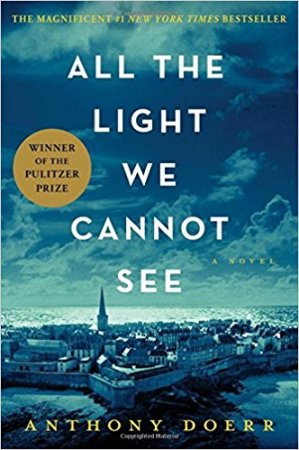 All the Light We Cannot See
All the Light We Cannot See About Grace
About Grace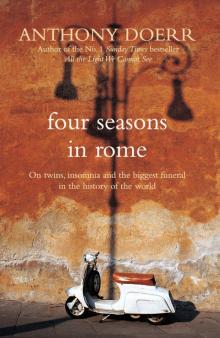 Four Seasons in Rome: On Twins, Insomnia, and the Biggest Funeral in the History of the World
Four Seasons in Rome: On Twins, Insomnia, and the Biggest Funeral in the History of the World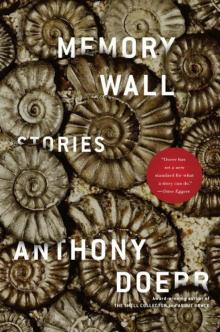 Memory Wall
Memory Wall The Best American Short Stories 2019
The Best American Short Stories 2019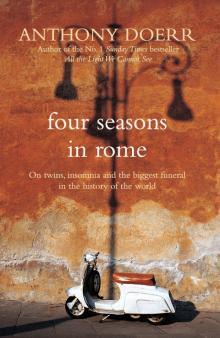 Four Seasons in Rome
Four Seasons in Rome The Shell Collector
The Shell Collector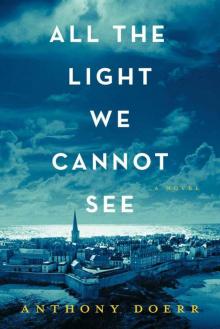 All the Light We Cannot See: A Novel
All the Light We Cannot See: A Novel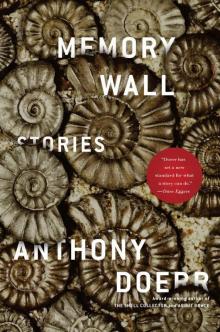 Memory Wall: Stories
Memory Wall: Stories Shell Collector
Shell Collector